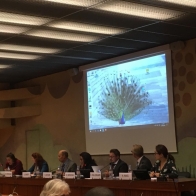IBE-UNESCO participates in a side event of the Human Rights Council, organized by the Permanent Mission of the Kingdom of Morocco, discussing UNESCO’s programme on Education for Youth and Human Rights within the conceptual framework of Global Citizenship Education (GCED).
Education for Youth and Human Rights are one of UNESCO’s priority areas. This comes from a mutual understanding, that education is not a privilege, it is a human right. Fulfilling and guaranteeing the right to education for all is safeguarded under the Universal Declaration of Human Rights as well as SDG 4 and the 2030 Education Agenda.
The side event, organized by the Permanent Mission of Kingdom of Morocco,
Youth and Human Rights Education: The human rights education of girls and boys in the prevention of inequalities and violence, was held on 25 September 2018 at the Palais des Nations, Geneva.
Moderated by Ms. Hind Idrissi Ayoubi, Member of the Committee on the Right of the Child, the event was opened by H.E. Mr. Omar Zniber, Ambassador of Permanent Mission of the Kingdom of Morocco; H.E. Mr. Henri Monceau, Ambassador of International Organization of the Francophonie; and Mr. Carl Hallergard, Aambassador, Deputy Permanent Representative of European Union. The panel featured, Ms. Elena Ippoliti, of OHCHR; Ms. Marie Wernham, Child Rights Education Consultant of UNICEF; and Ms. Hyekyung Kang of IBE-UNESCO.
Ms. Ayoubi shared her insights on human rights, “We need to establish a culture based on human rights in which our everyday lives become human rights practices”.
Ms. Ippoliti outlined OHCHR initiatives to raise awareness on fundamental rights and freedoms through education, building skills and capacities on the ground. She said, “Human rights education works and has worked, but empowerment can be achieved only if activities relevant to the learners and their context are included in programmes and tools”.
Ms. Wernham, also talked about the importance of the synergies between global issues and local realities mentioning that UNICEF approaches the topic with programmes based on learning through human rights, for human rights, and about human rights.
Ms. Kang from IBE-UNESCO explained how UNESCO particularly works around the area of human rights education, within the conceptual framework of Global Citizenship Education (GCED) towards the fulfillment of SDG 4.7. and further shared the three key approaches UNESCO takes -transversal, systemic and glo-local approach- to mainstream GCED in the education systems and curricula. She also emphasized the role of IBE-UNESCO in research, training and capacity building as well as developing training tools and guidelines to help strengthen Member States’ capacities.
For more information about UNESCO-IBE’s programme on Global Citizenship Education and relevant research and tools please visit:
IBE-UNESCO website and
IBE In-Progress Reflections Blog
